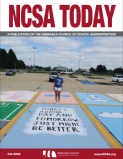Dr. Jon Habben
The purpose of this study was to determine whether or not two Nebraska statutes, Legislative Bill 1114 (Nebr. Rev. Stat. §77-3442, 1996) capping property tax levies and Legislative Bill 806 (Nebr. Rev. Stat. §79-1007, 1997) distributing state aid, had an effect upon the relationship between boards of education and their respective superintendents. The review of selected literature was focused on the quality and productivity of the relationship between a board of education and its superintendent and the importance of that relationship to the effectiveness and improvement of education in the district. The role of boards has been generalized to policy-making, while superintendents are said to be responsible for policy implementation and the overall operation of the district. The reality is that this distinction becomes simplistic given that real circumstances with real participants produce a range of human emotions to mix with both perceptions and facts. The relationships between Nebraska boards of education and their respective superintendents, across all size classifications, were not damaged by the implementation of LB 1114 and LB 806. No significant differences were found between the perceptions of board members and superintendents in the control group and those in the treatment group about their relationship regarding the legislation. Few examples of deteriorating relationships pushed over the edge, early retirements taken, board members not running for re-election, and public outcry were voiced by board presidents and superintendents as districts tried to handle consequences of the legislation. Respondents reported strong relationships based upon mutual respect, trust, courtesy, and communication, as well as reporting their relationships appeared strong enough to overcome disagreement. Uniting to face a common problem may have strengthened the relationship in some cases. At the same time, decreasing superintendent tenures resulting in increasing vacancies face smaller candidate pools in Nebraska, reflecting a national trend in districts of all sizes. Creating and maintaining the relationship between boards and their superintendents remains a concern.























